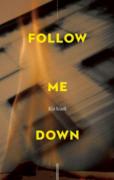
I started following Kio Stark’s writing on her blog, Municipal Archive, and loved her novel, Follow Me Down. My capsule description: noir where the antihero and the femme fatale are the same person.
She was kind enough to answer some questions below. They’re maybe a little spoilery, but I don’t think too much, since simply knowing that the tone is noir hints at the story’s likely trajectory. But if you haven’t yet read it, you can do so online. I encourage you also to purchase it. The interview is punctuated by her photos.
SR: I love the way your protagonist Lucy uses photography as a way to simultaneously study and distance herself from her surroundings. Did your own photography influence Follow Me Down?
KS: Absolutely. Lucy is by no means a disguised version of me, but there are ways in which she sees with my eyes. I have a habit of photographing the places where people have been and are no longer, and I use toy cameras a lot. They’re rangefinders, which means that there’s no mirror – so what you see isn’t precisely what the lens sees. They have light leaks and bowed plastic lenses. It’s a way of trying to make beautiful things with uncontrolled conditions. I didn’t think about it until you mentioned distancing and photography together. The reliance on accident is also a way of distancing yourself from what you create.
SR: When Lucy & Jimmy have broken into the vacant lot and he worries about them being visible in her pictures, she says, “It’s okay, we’ll just be ghosts.” It seemed like that was often how she wanted to move through the world; spectral, barely discernible, disconnected from humanity. What was it like to write from the point of view of someone so deeply uncomfortable with forming close relationships?
KS: Lucy’s emotional landscape was very lonely and also very free. It’s like the moment you arrive in a new place, or the conversations you have in diners on the long drive from the place you left to the place you’re going. For most of us, those limbo times are exciting, because the disconnectedness gives us freedom, and nothing is decided yet, and we know we will make choices and step back into the anchored world a little more like the person we want to be. Lucy stays in limbo. She has freedom there, but she also can’t change. The traditional trajectory would have been for her trouble with closeness to resolve somehow at the end, and in a way I was rooting for Lucy to find some comfort in love, but she never did come around to it.
SR: Lucy’s skill in finding mistakes in documents resonates well with the way she observes the people around her in the city; she’s always looking for how things go wrong. At what point in your writing process did you decide that she worked as a proofreader?
KS: Oh that was very early on. I had her in an office and I thought, what does this woman do? She notices tiny details. It started with imagining her at a desk and trying to understand what she would be doing there, not with thinking up a job for her.
SR: Follow Me Down is such a big-city story. Would you ever want to write something set in a non-urban environment?
KS: That’s a great question. My imagination is pretty urban. I remember the streetscapes of a dozens of cities I’ve seen in dreams. I’ve been working on something for a while that’s set in a smaller city, more like a sizable broken down factory town. What holds me in the urban realm is what cities look like, and also the way that cities run on the minute electrical charges generated by the passing of strangers on the street.
SR: Did you know when you started how the book was going to end? If not, when did that become clear to you?
KS: I did not know. In fact, the first draft had a totally different ending. It turned into a very elaborate sort of con story, with everything folding in on Lucy at the end. My boyfriend read it and asked me, why does this have to be a con? He said, it feels like you’re hiding something emotionally true about Lucy by taking the agency out of her hands. So I thought, ok, what’s true here is her deep immersion in the search. What’s driving that if you take away the outside forces luring her into it and teasing her along? What does it mean to get lost, to be found?






